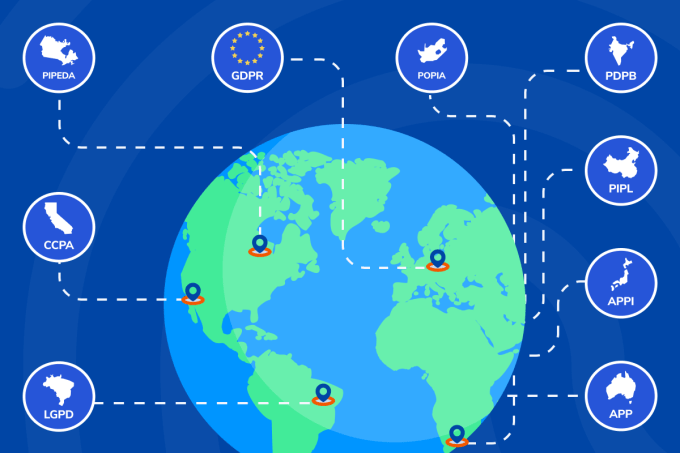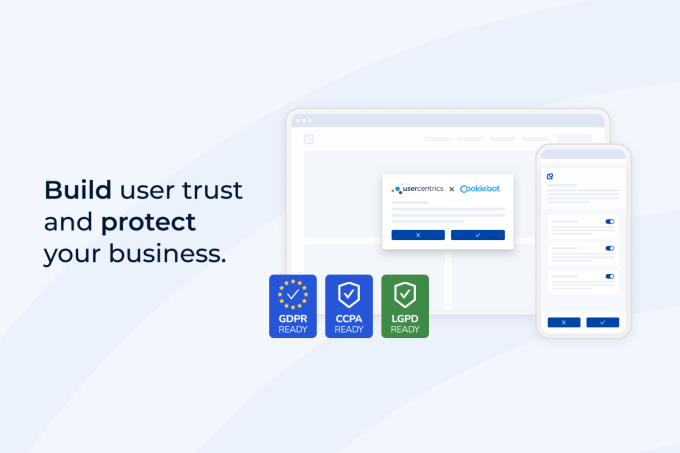Every day millions of people online freely give up their data to ecommerce stores, games, apps, social platforms and others as a trade-off for digital services and personalized experiences. However, consumers’ willingness to part with their data without question is on the decline, according to studies like this 2020 one by McKinsey. Companies are noticing a strong and increasing trend: privacy matters.
Data privacy laws around the world
Privacy laws are on the rise on a global scale, and not only in Europe, where the General Data Protection Regulation (GDPR) has been in effect since 2018. South Africa, Brazil and China have passed privacy laws, three US states have passed laws, and many more are in the making. Canada also has an update to its 20-year-old privacy law in the works.

Image Credits: Usercentrics (opens in a new window)
According to Gartner, 65% of the world’s population will have some protection under national or regional privacy law by 2023. That percentage is rapidly increasing, driven in no small part by consumer demands. Major news stories about companies getting caught making unauthorized use of consumers’ data, or about massive data breaches, have become all too common. Nishant Bhajaria, privacy architect at Uber and author of the book Privacy Engineering, has noted, “Keeping up with the latest changes can be like jumping on a treadmill when it’s already going. Important with data privacy is that as a company, you don’t only take action when it is too late.”
The 2020 McKinsey survey dug into the effects of a lack of data privacy on consumer behavior and the results are dramatic: 71 % of users decided to take their business elsewhere if they had concerns about a company’s handling of data privacy.
In the United States, while there is not yet a federal privacy law, the first state-level law was passed in California with the California Consumer Privacy Act (CCPA), which came into effect in January 2020. The GDPR was influential on this law, as the CCPA has in turn been influential on other states’ legislation, including Virginia (Consumer Data Protection Act), Colorado (Colorado Privacy Act), and Washington (the still in-progress Washington People’s Privacy Act).
Such is the speed of change with technology and evolving consumer expectations that California has already passed a second law, the California Privacy Rights Act (CPRA), to augment and partially replace the CCPA. It is due to come into effect in 2023.
The value of data privacy compliance
Crucial to the evolving privacy-first landscape is what social scientists refer to as “information flows”. Companies need to be transparent about user data they collect and process via websites and apps. Users, in turn, need more control over what data is shared and how. This creates greater trust between users and businesses, which encourages better user experiences, higher acceptance rates to drive marketing strategy, and greater lifetime values. Not to mention compliance with relevant privacy regulations and avoiding fines.
As more companies come to understand the value as well as the necessity of data privacy compliance, the demand for flexible and sophisticated tools to manage their needs has been growing quickly. Companies are realizing that startups have compliance requirements just as multinational enterprises do. Consumers need to be able to provide informed consent for data collection and use. This goes for apps as well as websites, and for the use of cookies and other web technologies as well as for direct marketing applications.
Usercentrics and Cookiebot unite
To meet those broad, complex and evolving needs, leading CMPs Usercentrics and Cookiebot have joined forces to become a global market leader in Consent Management solutions, doing business as Usercentrics.
Bringing together Usercentrics’ enterprise expertise with the unrivaled scanning technology and SMB reach of Cookiebot consent management platform, the new Usercentrics entity will become the European market leader and operate as a world leading plug-and-play Consent Management Platform provider.
The combined business will address the growing global demand from end users for greater data privacy and transparency. The company is scaling to support organizations all over the world that are affected by the GDPR and new and impending regulations, empowering those organizations to handle their users’ data compliantly and in a way that builds trust and competitive advantage.
The new Usercentrics business has a diverse customer base and partner network that includes more than 20 technology and 2,000 channel partners, serving organizations of all sizes in over 100 countries, across 700,000+ websites. Businesses and their users trust the handling of an average 61 million consents per day to Usercentrics and Cookiebot. The merger will focus on growing both companies by sharing resources and expertise to best serve all customer segments.

Image Credits: Usercentrics (opens in a new window)
Get your free website check and detailed privacy risk report about cookies and other technologies in use on your website: Website check for SMBs | Website check for Enterprises